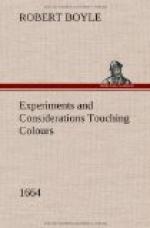however, I suspected that the Tinging Particles did
abound with such Salts, whose Texture, and the Colour
springing from it, would probably be alter’d
by peircing Acid Salts, which would in likelihood
either make some Dissipation of their Parts, or Associate
themselves to the like Bodies, and either way alter
the Colour exhibited by them; whereupon Pouring into
a small Vial full of Impregnated Water, a very little
Spirit of Vinegar, I found that according to my Expectation,
the Caeruleous Colour immediately vanish’d, but
was deceiv’d in the Expectation I had, that
the Golden Colour would do so too; for, which way
soever I turned the Vial, either to or from the Light,
I found the Liquor to appear always of a Yellowish
Colour and no other: Upon this I imagin’d
that the Acid Salts of the Vinegar having been able
to deprive the Liquor of its Caeruleous Colour, a
Sulphureous Salt being of a contrary Nature, would
be able to Mortifie the Saline Particles of Vinegar,
and Destroy their Effects; And accordingly having
plac’d my Self betwixt the Window, and the Vial,
and into the Same Liquor dropt a few drops of Oyl of
Tartar
per Deliquium, (as
Chymists call
it) I observ’d with pleasure, that immediately
upon the Diffusion of this Liquor, the Impregnated
Water was restor’d to its former Caeruleous
Colour; And this Liquor of
Tartar being very
Ponderous, and falling at first to the Bottom of the
Vial, it was easie to observe that for a little while
the Lower part of the Liquor appear’d deeply
Caeruleous; whilst all the Upper part retain’d
its former Yellowness, which it immediately lost as
soon as either Agitation or Time had made a competent
Diffusion of the Liquor of
Tartar through the
Body of the former Tincture; and this restored Liquor
did, as it was Look’d upon against or from the
Light, exhibit the Same
Phaenomena as the Tincted
Water did, before either of the Adventitious Liquors
was pour’d into it.
Having made, Pyrophilus, divers Tryals upon
this Nephritick Wood, we found mention made of it
by the Industrious Jesuit Kircherus, who having
received a Cup Turned of it from the Mexican
Procurator of his Society, has probably receiv’d
also from him the Information he gives us concerning
that Exotick Plant, and therefore partly for
that Reason, and partly because what he Writes concerning
it, does not perfectly agree with what we have deliver’d,
we shall not Scruple to acquaint you in his own Words,
with as much of what he writes concerning our Wood,
as is requisite to our present purpose. Hoc loco
(says he)[17] neutiquam omittendum duximus quoddam
ligni candidi Mexicani genus, quod Indigenae Coalle
& Tlapazatli vocant, quod etsi experientia hucusque
non nisi Caeruleo aquam colore tingere docuerit, nos
tamen continua experientia invenimus id aquam in omne
Colorum genus transformare, quod merito cuipiam Paradoxum
videri posset; Ligni frutex grandis, ut aiunt, non
raro in molem arboris excrescit, truncus illius eft




